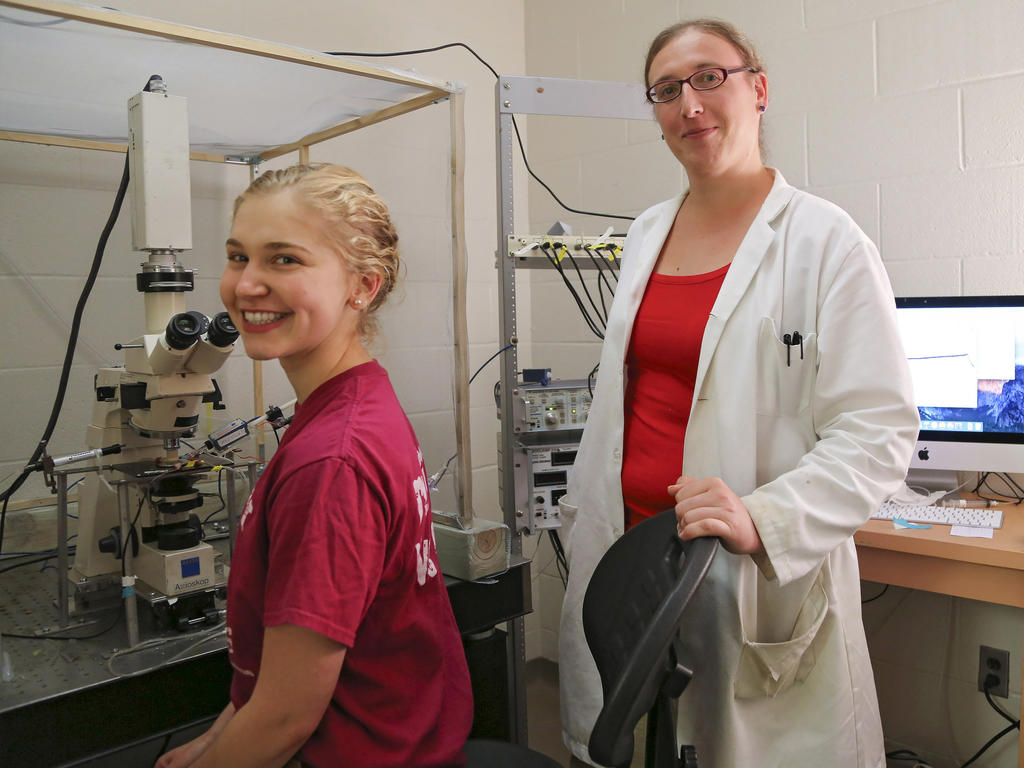For neuroscience major Madeline Evans ’18 of New Orleans, LA, Rhodes College has provided the best of both worlds when it comes to academics.
“Declaring a science major sometimes steers you down a structured track of classes, but at Rhodes, I have been able to complement my neuroscience major with electrophysiology research in the field, while still being able to minor in religious studies,” Evans explains.
This summer, Evans has been conducting research full-time through a fellowship with neuroscience professor Dr. Kelly Dougherty. Says Dougherty, “Although I spend a great deal of time with my laboratory students during the semester, classes demand so much attention that there’s only so much work that can be accomplished. Fortunately, Rhodes provides fellowships that support full-time student research in the laboratory over the summer. This is where the real magic of the laboratory happens, as I work day after day with my research fellow. The skills and perspectives that they can learn during such an intense experience are far beyond what could be learned during the school year.”
Dougherty's research focuses on the mechanism of action for several common anti-epileptic drugs. Evans was invited onto Dougherty's team after taking her Introduction to Neuroscience and Research Methods courses, and her work has proved helpful in reinforcing what she learns in the classroom. "I’m working independently on a project studying the effects of anti-epileptic drugs in the hippocampus through extracellular field recordings. After Dr. D and I proposed an initial experimental design, I did some preliminary experiments to finalize a protocol for the project," Evans explains. "I’ve learned a lot more through troubleshooting along the way than I ever would have if I had been handed a manual."
To research electrophysiological processes of the brain, Evans and Dougherty have been using electrophysiological rigs specially built by Dougherty. She explains that a rig is a work station that can take on many forms, depending on the type of experiment being performed. “They are basically sophisticated microscopes coupled with extremely precise micromanipulators, surrounded by a Faraday cage (to limit electrical interference). There are many additional systems and sub-systems built into the rig that allow me to keep the neurons under study alive, and collect high quality electrophysiological data from them. Specifically, we have one rig for intracellular recording, and another for extracellular recording."
Using such sophisticated equipment helps prepare Dougherty’s students for futures in the scientific workforce. "One of the core principles that I stress to my students is that they need to be able to build and repair as much of their equipment as possible. Students often focus on the intellectual side of their education, but neglect its practical applications," says Dougherty. "I try to break down this barrier in my laboratory by showing students that they can make useful things in the real world. This can be truly transformative for a student, and instills a “can do” attitude that carries over into their professional life. I want them to develop the capacity for invention, even if it’s on a small scale." Dougherty’s own resourcefulness has allowed her to build a lab at Rhodes resembling one that might be found at a larger research university.
Evans’ own expectations for research at Rhodes have been exceeded because of the high-level work she is doing in Dougherty's lab. "The electrophysiology that we complete in lab isn’t typically offered to undergraduates, especially at liberal arts colleges. It is a unique opportunity among undergraduate research programs. I have been able to learn skills that would be expected of a graduate level student elsewhere, because of Dr. D's mentorship."
By Katherine Hancock ’19
